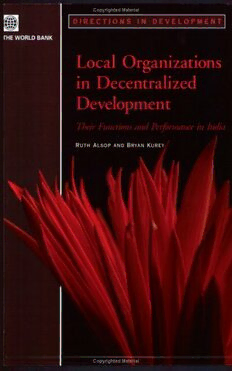
Local Organizations in Decentralized Development: Their Functions and Performance in India (Directions in Development) PDF
184 Pages·2005·2.141 MB·English
Most books are stored in the elastic cloud where traffic is expensive. For this reason, we have a limit on daily download.
Preview Local Organizations in Decentralized Development: Their Functions and Performance in India (Directions in Development)
Description:
Local organizations have become key mechanisms in effective, fair, and sustainable resource management and development in India. This book adds empirical evidence to the debate on whether or not these functions are performed as expected. Based on research in three sectors in three states in India, the authors' findings indicate that the design of and support for local organizations are often little more than rudimentary, resulting in less than adequate performance and raising serious sustainability concerns. Two debates dominate discourse on the roles of organizations. The first is a practical one on how to make local organizations function effectively. The second focuses on the relative roles of government organizations—both elected local governments and administrative line departments—and different forms of non-government organizations, including the private sector and community groups at the local level. This study suggests that these debates cannot be separated and indicates that sector-specific configurations of a plural organizational landscape, in which government, non-government, and private organizations are an integral part, are required for effective and sustainable development. 'Local Organizations in Development' will be an invaluable resource for those concerned with the analysis, policy, and practice of development initiatives that seek to further decentralize governance and development.
See more
The list of books you might like
Most books are stored in the elastic cloud where traffic is expensive. For this reason, we have a limit on daily download.
